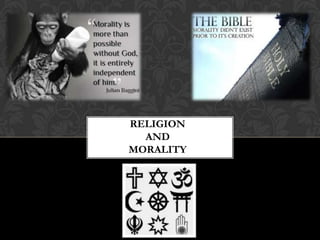Phil21 wk7 religion & morality
- 2. THE ARGUMENT FROM MORAL NORMS (FOR THE EXISTENCE OF GOD) P1. Moral norms exist and have authority. P2. If they have authority, there must be a reliable motive for human beings to be moral. P3. No such motive could exist, unless there was an omniscient, omnipresent, wholly just agent to attach sanctions to behavior under moral norms. C1. Therefore God exists
- 3. IS MORALITY POSSIBLE WITHOUT RELIGION? "If there is no order to the universe, and therefore some being, some force that ordered it, then who determines what is right or wrong? There is nothing immoral if there's nothing in charge.ŌĆØ - Reverend Al Sharpton Does anyone truly believe that our ancestors lacked social norms before they had religion? Did they never assist others in need or complain about an unfair deal? - Frans de Waal
- 4. IS MORALITY POSSIBLE WITHOUT GOD? SEVERAL DISTINCT QUESTIONS ItŌĆÖs important here to separate: ŌĆó Moral sentiments - empathy, compassion, altruism, love, shame ŌĆó Moral judgments of good/bad right/wrong ŌĆó Moral motivation - the motivation to do what is good or right 1. Are atheists actually less, more, or equally as moral as theists? 2. What can serve as the source of moral value? (GodŌĆÖs word? Social norms? Instincts? Empathy? Rationality?) 3. Is religion conceptually or socially better placed to encourage moral behavior than non-religion? 4. What counts as a proper motivation for performing a moral action? (Because you want to? Because you recognize that you have to? Because itŌĆÖs in your interests - e.g. you want heavenly rewards?)
- 5. THE EUTHYPHRO DILEMMA Is what is pious loved by commanded by Godis pious, or is morally "Is the morally good the gods because it because it good, or is itbecause it is loved by the gods?ŌĆØ is it pious morally good because it is commanded by God? - Plato, ŌĆ£EuthyphroŌĆØ, 10A OPTION 1: OPTION 2: God commands what is morally GodŌĆÖs commandment is what makes good because it is morally good something morally good FATAL FLAW: FATAL FLAW: God has nothing to do with whether Goodness is an arbitrary product of something is or is not good. God is GodŌĆÖs will. God is not the basis of not the basis of morality. morality.
- 6. MORALITY AND EVOLUTION Genuine altruism and morality in other species? ŌĆó chimpanzees and bonobos will voluntarily open a door to offer a companion access to food, even if they lose part of it in the process. ŌĆó dominant monkeys (those who have least to fear) are the most generous. ŌĆó when PeonyŌĆÖs (an old Chimpanzee) arthritis is flaring up, she has trouble walking and climbing, but other females help her out ŌĆó chimpanzees commonly console distressed parties, hugging and kissing them ŌĆó primates will happily perform a task for cucumber slices until they see others getting grapes, which taste so much better. - Frans de Waal
- 7. MORALITY AND MORAL EMOTIONS - Frans de Waal ŌĆó Our moral sentiments and intuitions come to us from our evolutionary background as social animals. ŌĆó Morality starts from these sentiments, but strives beyond them for logical coherence and principled explanations.
- 8. HOW DOES RELIGION FIT INTO THIS? - Frans de Waal Religion gives us a supporting narrative for morality ŌĆō itŌĆÖs an attempt to explain, justify, and motivate us to do and be good. E x a m p l e o f a l t e r n a t ive Example of religious application philosophical application Q: How do we know stealing is Q: How do we know stealing is wrong? (explanation) wrong? (explanation) A: God, who knows everything, reveals A: We have good arguments that justify this to us. our belief that this is so. Q: Why should we not steal? Q: Why should we not steal? (motivation) (motivation) A: God watches us and judges us on A: It would make us hypocrites, since our actions. If we steal, we will suffer. we do not want others to steal from us. If we refrain, we will be rewarded. And we donŌĆÖt want to be hypocrites







